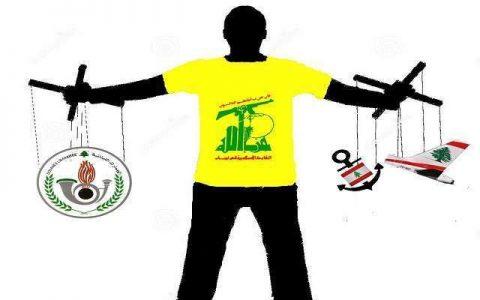
Hezbollah and the Lebanese Customs
It is general knowledge in Lebanon that Hezbollah took over several of the country’s entryways (airport and seaports), as well as controls the Lebanese Customs. Hezbollah has controlled the Rafiq Hariri International Airport in Beirut at least since 2006. [1][2]
The organization uses its control over ports and customs in order to smuggle into the country both weapons for its military operations (mainly from Iran) and custom-exempt goods for its financial purposes. Furthermore, a diamond expert has declared that Hezbollah’s control over the airport facilitates the smuggling of diamond via Africa. Recently, several anti-Hezbollah Lebanese MPs have given statements to the press regarding the organization’s smuggling activities. Lebanese MP Khaled Daher claimed that the head of the Supreme Council of Customs, Brigadier General Nizar Khalil, has violated the rules of customs in Lebanon. The council is usually composed of a Shiite member, a Sunni member and a Christian member. The Sunni member has retired, but Khalil has continued with the council’s actions without appointing a new Sunni member. Daher claimed that Hezbollah has laid hands on the Hariri airport, and that custom officials cooperate with smugglers.
Since the airport is no longer supervised by a Christian and a Sunni member, smuggling became rampant. Nizar Khalil has stopped the random checks of containers, and now checks all containers, which means increased costs on traders and delays in the distribution of goods. Now, when goods are moved from the port of Beirut to the port of Tripoli, and since there’s only one inspector at the port of Tripoli, the trucks are being directed to the Syrian border. From there the goods are smuggled via Syria. The traders pay $5000 to the Syrian Army, $5000 to Hizballah and some money to the smugglers, who transfer the goods to the ports of Latakia and Tartus, from there to Homs–al-Qasir and Hermel, and then smuggle them back into Lebanon. In a similar vain, MP Ahmad Fatfat declared that Hizballah facilitates the smuggling of containers via the air and sea passages under its control, charging $500 per container. Beirut airport has become a strategic action center for Hizballah, for the smuggling of arms through Lebanon. An anonymous source working at the Rafiq al-Hariri airport said that Iranian airplanes smuggle weapon and military equipment to Hizballah via the airport.
Lebanese sources blame Hizballah for opening the airport’s storage facilities to Quds Force’s Unit 8000, in charge of moving weapons from Iran. Unit 8000 also transfers cash and custom free goods through the airport. As a result of the custom exemption for Hizballah-favored traders, electronics dealers in Beirut complain that they cannot compete with traders of smuggled goods from the Dahiyya area. Smart phones sold by such contraband traders in the Dahiyya are $150 cheaper than in the rest of the country, since these traders specialize in goods imported without customs by Hizballah. Due to the airport’s failure to conform with EU standards regarding the transfer of goods, British Airways has stopped cargo flights via the airport since February 2015. Another Lebanese MP Mustafa Alush, said that Hizballah has been laundering money, smuggling drugs and evading tax and custom payments for years.
The drug that is mentioned most often in this context is Captagon. The main manufacturer and dealer of the drug is the brother of Hizballah MP Husein Mosawi. Another major drug dealer is the son of Sheikh Husein Kurani. According to one source, Ali Amar, the brother of a Hizballah MP, imports cigarettes and Cuban cigars into Lebanon without paying customs or taxes. Another source (in an Arabic forum) claimed that the Construction Jihad (Jihad al-Bina) imports construction materials that are exempt from customs. The source added that Hizballah acts under the disguise of Arcom al-Moussawi Company for building materials. Other forms of cooperation between Hizballah and smugglers include reduce fines for smuggled goods caught by Lebanese customs. In 2013, a TV crew conducting a journalistic investigation regarding corruption at the customs department was arrested and beaten by customs officials.
Conclusions
It is a known fact that Hezbollah controls the Lebanese Customs, most visibly through goods transferred via the Rafiq Hariri Airport and the Beirut seaport.
Hezbollah’s control over the customs and airport:
1. Taints the Lebanese economy with corruption.
2. Allows Hizballah to smuggle weapons and other combat support equipment into the country.
3. Allows Hizballah to smuggle drugs, diamonds, and other goods into/from Lebanon in order to augment the organization’s finance.
4. Puts International transportation companies at risk.
5. Benefits Hizballah financially, due to income from the customs activity.
6. Breaches the basic rights of Lebanese traders and citizens.
7. Harms Lebanon’s credit rating in the international community.
8. Involves international companies that sell combat support equipment to Lebanon in terrorist activity, as this equipment ends up in the hands of Hizballah.
9. Risks passengers, equipment, and companies going through the airport.




